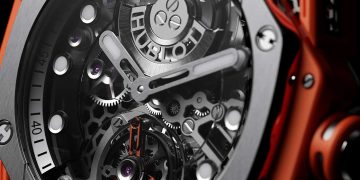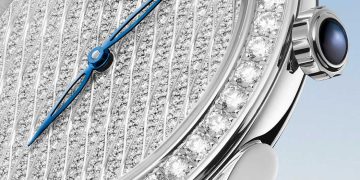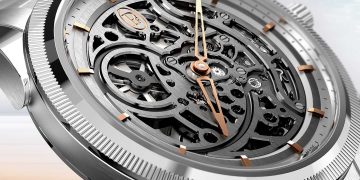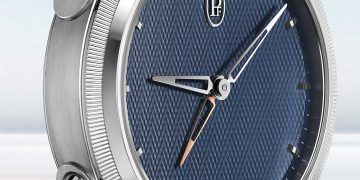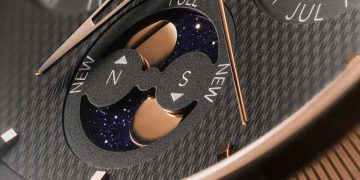The Legacy Machine 101 (LM101) series was first launched in 2014. As suggested by its “101” name, it focuses on the essentials of a mechanical wristwatch, contained in one of MB&F’s most compact Machines with a case diameter of 40mm. At the time, the LM101 movement was also the first entirely conceived by MB&F’s in-house engineering team.
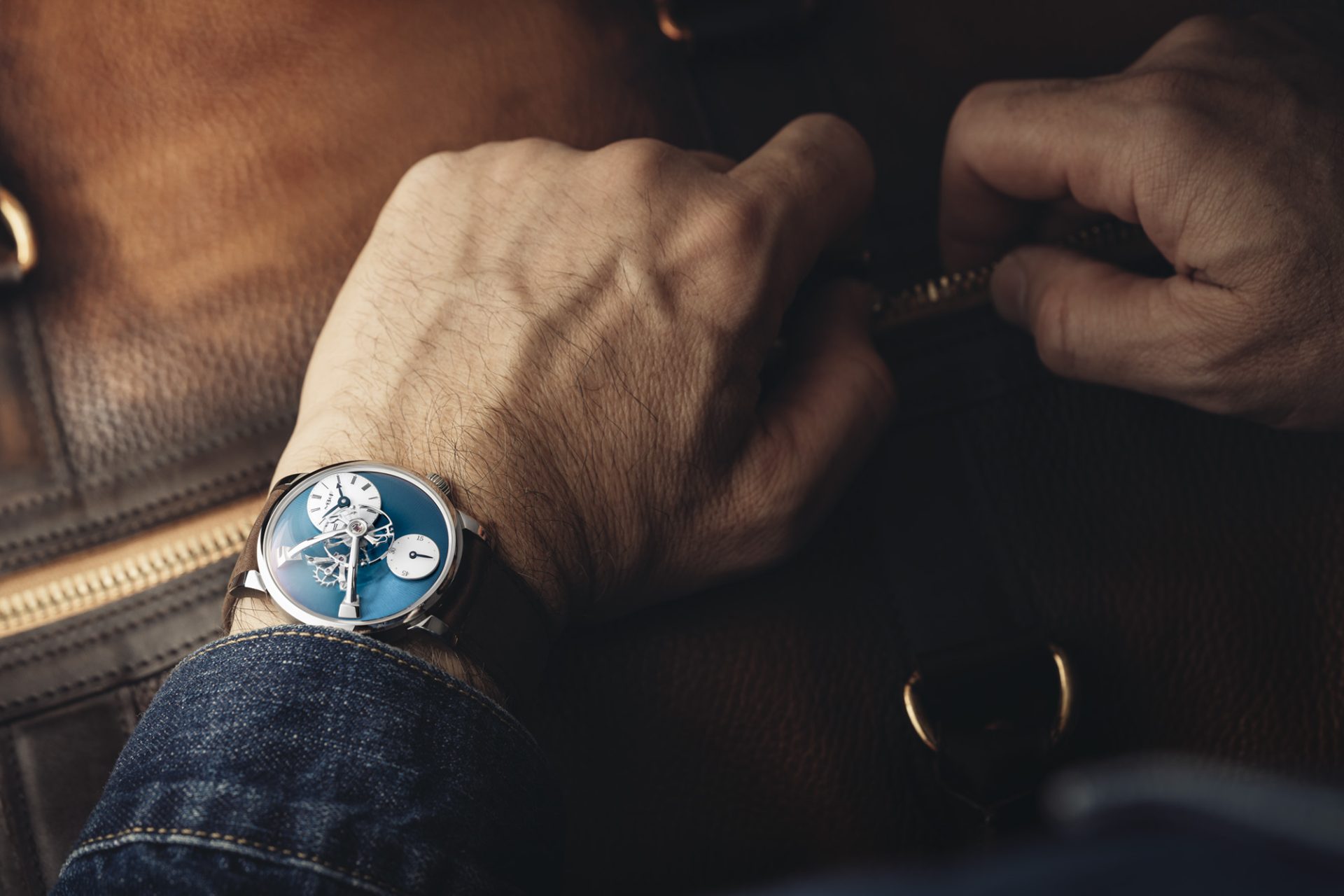
In 2021, the LM101 series evolves with technically and aesthetically-upgraded versions distinguished by colourful dial plates, including a stainless steel version. Focusing further on the essentials, the bezel and “Legacy Machine” engraving on the dial withdraw to highlight the time and power reserve, indicated on slightly larger subdials; and the star of the show, the signature “flying” balance wheel, inherits a double hairspring.
Legacy Machine 101 embodies and accentuates the very essence of what is essential in a wristwatch: the balance wheel, which is responsible for regulating precision; how much power remains in the mainspring, which indicates when it needs to be next wound; and of course, the time.
Visually, LM101 is dominated by the monumental suspended balance wheel, its sedate oscillations drawing the eye ever closer. Two pristine-white subdials hover just above the fine sunray-engraved movement top plate. At the top right, highly legible hours and minutes are displayed by beautiful blued-gold hands contrasting against the immaculate white, while the 45-hour power reserve indicator is displayed in a smaller, but similar subdial below. Two ‘Frost’ limited editions presented in 2015 provided additional contrast between these elements and the effervescent backdrop of their hand-finished frosted dial plates.
In an apparent feat of magic, the sapphire crystal protecting the dial appears to be invisible; creating the illusion that you can reach out and touch the prodigious balance wheel hanging mesmerisingly from elegant twin arches. The arches are milled from a solid block of metal and require many hours of hand polishing to achieve their mirror-like lustre.
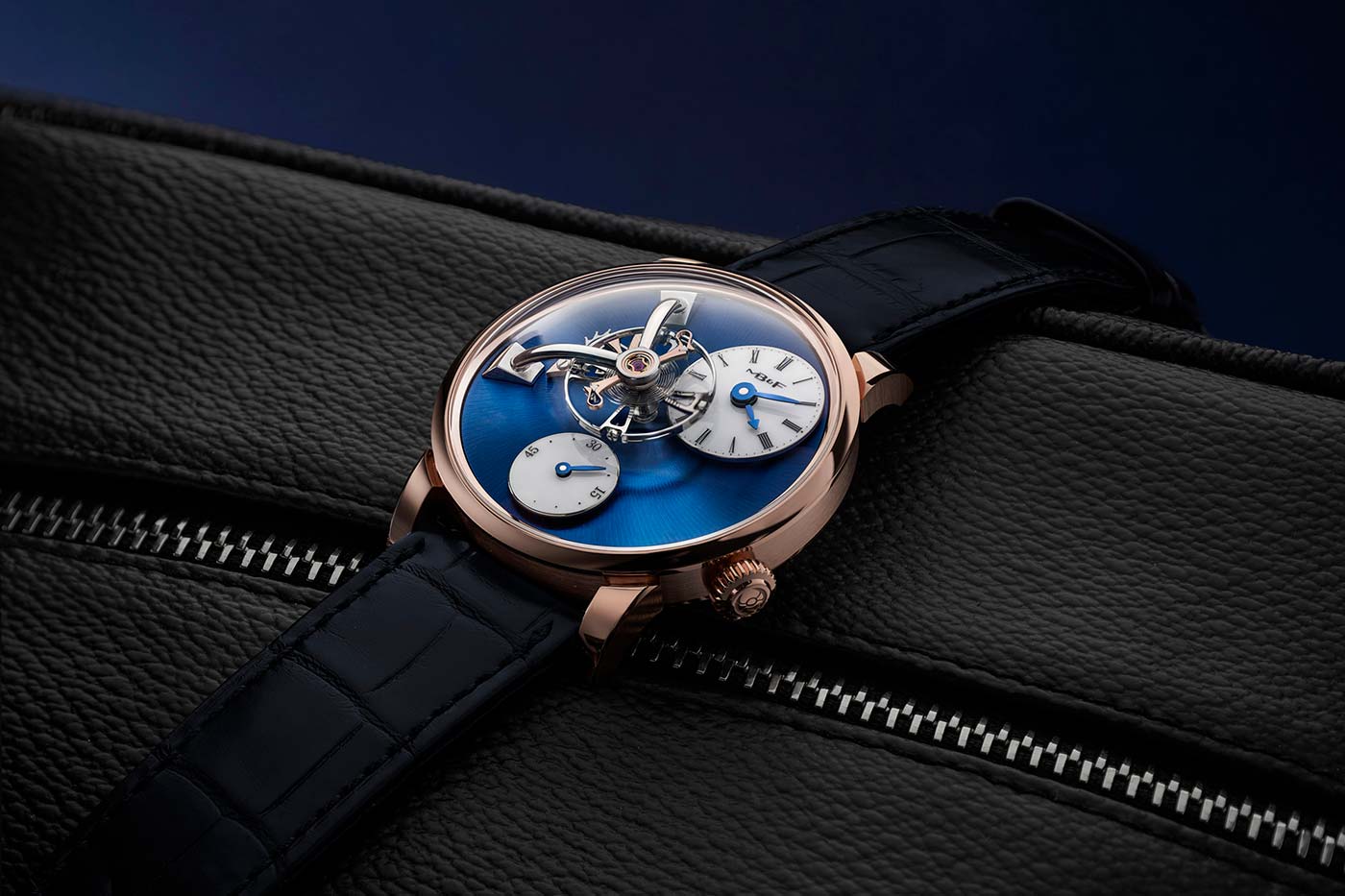
Turning over Legacy Machine 101, the display back crystal – domed to reduce the thickness of the caseband and, visually, the height of the watch – reveals the exquisitely hand-finished movement. Sensually curved plates and bridges pay homage to the style found in high quality historic pocket watches and testify to the respect accorded to historical legitimacy.
With its undulating Geneva waves, hand polished bevels, gold chatons and countersunk blued screws, the beauty of LM101’s movement doesn’t just stay faithful to a bygone era. It also heralds the dawn of a new epoch as it was the first MB&F calibre to be entirely conceived and designed in-house. Indeed, while award-winning independent watchmaker Kari Voutilainen took responsibility for the movement’s fine finishing specifications and fidelity to the horological past, its architecture and construction are 100% pure MB&F.
LM101 was first launched in 18k red or white gold, then in two limited ‘Frost’ editions with frosted finishing (18 and 33 pieces), followed by limited editions of 33 pieces in platinum 950 and 18 pieces in palladium. The 2021 upgraded versions are available in 18k white gold with a purple dial plate, 18k 5N+ red gold with a royal blue dial plate, and stainless steel with a light blue dial.
LEGACY MACHINE 101 IN DETAIL
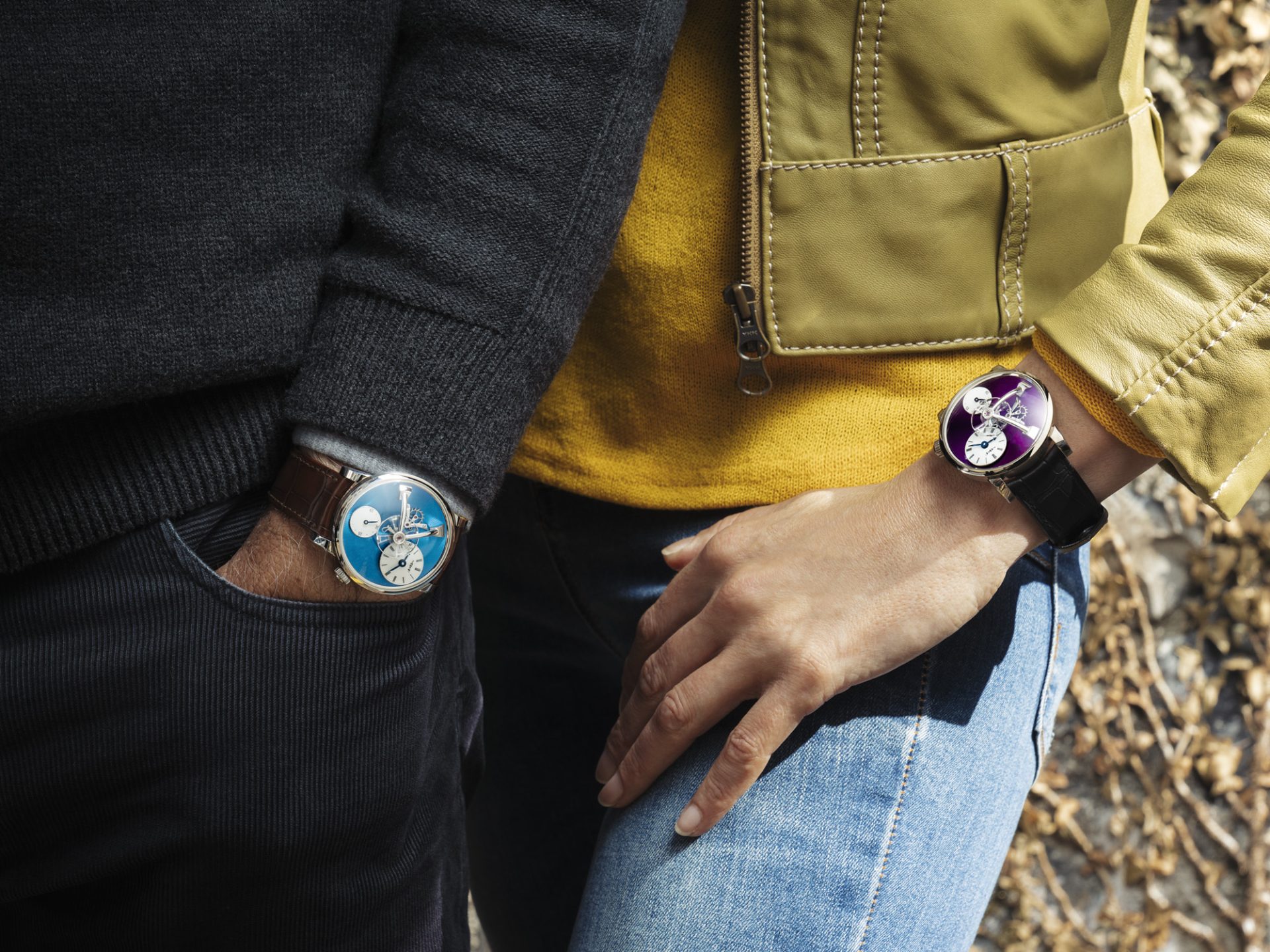
Engine: While the movement of Legacy Machine 101 is superficially similar to that of Legacy Machine No.1, closer examination reveals that it is an entirely different calibre. It is not merely a scaled down version of LM1’s movement, but was specifically conceived and developed in-house by MB&F with the objective to fit in a 40mm case.
The balance wheel and spring are at the very heart of any mechanical watch movement and their isochronal (equal intervals of time) oscillations regulate the movement’s precision. MB&F founder Maximilian Büsser has long been fascinated by the large slowly oscillating – 2.5 Hz/18,000 vph compared with the much faster 4 Hz/ 28,800 vph more common today – balance wheels of antique pocket watches. So it was no surprise that this was his starting point.
What was surprising though is just how radically he re-interpreted tradition by relocating the balance wheel from its more usual position hidden at the back of the movement to majestically floating not just the above movement but high above the dial.
While the location of LM101’s oscillator may be considered avant-garde, ‘tradition’ is upheld by the large 14mm diameter balance wheel, featuring regulating screws specifically developed for MB&F, balance spring with Breguet overcoil and mobile stud holder. The latest versions feature a double hairspring first seen in the LM101 Performance Art editions born from the MB&F x H. Moser & Cie collaboration in 2020.
If you thought that the balance wheel looks impressive in Legacy Machine N°1, it looks even larger in the smaller diameter setting of LM101.
Dial and Indications: While the animated suspended balance visually dominates LM101, the immaculate white dials for the time (hours and minutes) and power reserve indications are both aesthetically appealing and highly legible thanks to the high contrasting blue hands.
Complementing the three-dimensionality of the balance floating in space, the white dials with their bright blued-gold hands float just above the top of the movement. The dials are gently domed with a translucent, high-gloss lustre created using a laque tendue process in which multiple layers of lacquer are applied and heated, causing them to stretch over the surface of the dials.
To ensure aesthetic purity of the dials, a sophisticated fixation underneath removes the necessity of visually obtrusive attachment screws. A fine golden perimeter circumscribing each dial elegantly reinforces their timeless classicism.
Fine Finishing and Historical Legitimacy: While the movement was developed entirely in-house, acclaimed master watchmaker Kari Voutilainen assumed responsibility for ensuring the movement’s historical accuracy of the bridge design and fine finishing.
A finely engraved sun-ray pattern on top of the movement plate (dial side) subtly catches the eye at certain angles without distracting attention from the white dials of the time and power reserve indications and suspended floating balance. But it is in the style and finish of the bridges and plates visible through the display on the back of the movement where Kari Voutilainen has excelled in providing exquisite historical fidelity in both the shape of elegantly curved bridges and the traditionally wide space between the bridges and between the perimeter of the bridges and the case.
On the back of the movement, over-sized ruby jewels set in highly-polished countersunk gold chatons provide striking visual counterpoints to the Geneva waves. While providing historical links with the large jewels seen in high-grade antique pocket watch movements, the ruby bearings have a practical application in reducing wear/increasing longevity by accommodating large diameter pinions and holding more lubricating oil.
Frosted finish for the Frost editions: In the late 18th and early 19th centuries, frosting was created by treating the components with a special acid mixture and then heating on an open flame (what could possibly go wrong). The result was a silvery-white effect looking similar to frost, which protected the surfaces from oxidation; this was important when watches and clocks were not water resistant at all.
As watchmakers became more attentive to the potential hazards associated with working with powerful acids, alternative methods were explored, the most effective – in terms of the quality of finish – being to very carefully brush the surface with a wire brush. However, it is extremely difficult to obtain a uniform result because just slightly too much pressure or brushing for too long can quickly ruin the desired matte surface with uneven polish.
Today there are very few craftsmen with the skills and experience necessary for creating a traditional frosted finish, and they closely guard their secrets. Modern traditional brushed frosting actually burnishes the surface (compresses the metal without removing material), creating a finish so hard that it is impossible to hand engrave.
Inspiration and Realisation:
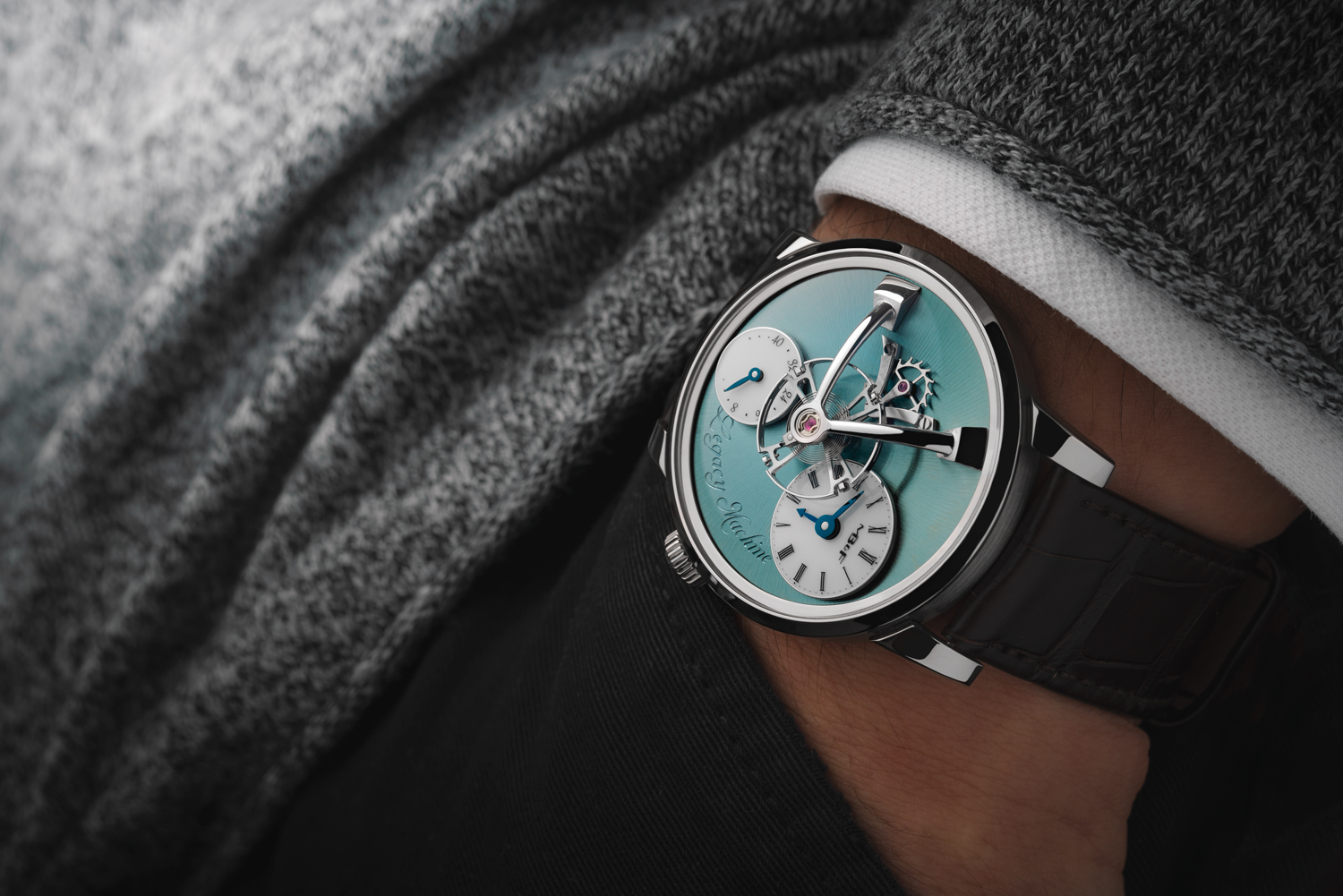
MB&F’s Legacy Machines were conceived when Maximilian Büsser started fantasising: “What would have happened if I had been born in 1867 instead of 1967? In the early 1900s the first wristwatches appear and I would want to create three-dimensional machines for the wrist. There are no Grendizers, Star Wars or fighter jets for my inspiration but I do have pocket watches, the Eiffel Tower and Jules Verne. So what might my early 20th century machines look like? They had to be round (tradition) and three-dimensional (MB&F Machine): Legacy Machines are the answer.”
Maximilian Büsser has had a long affinity with pocket watches of the 18th and 19th centuries. Virtually all horological complications we see today were not only imagined in that period, they were developed using just paper and pen (no sophisticated computer programs), components were produced to extremely high precision using – by today’s standards – fairly primitive machines (no electricity) and finely finished, assembled and regulated to an incredibly high quality that we still strive to match today. Their generous size compared with modern wristwatches allowed for uncluttered movement architectures with beautifully shaped bridges and plates.
While MB&F’s futuristic Horological Machines have a firm foundation in the very best of traditional horology, Büsser wanted to pay homage to that rich tradition by imagining the type of timepiece he might create if he had been born a 100 years earlier. With its large, sedately oscillating balance, domed dials, historical bridge design and classical fine-finishing, Legacy Machines are the very contemporary, yet traditionally elegant fruition of that dream.
LM101 – TECHNICAL SPECIFICATIONS

Engine
Three-dimensional horological movement developed in-house by MB&F
Movement aesthetics and finishing specifications: Kari Voutilainen
Manual winding with single mainspring barrel
Power reserve: 45 hours
Balance wheel: Bespoke 14mm balance wheel with four traditional regulating screws floating above the movement
Balance spring: Traditional Breguet curve terminating in mobile stud holder; Straumann® double hairspring for the 2021 editions
Balance frequency: 18,000bph/2.5Hz
Number of components: 229 components / 231 for the 2021 editions
Number of jewels: 23 jewels
Chatons: gold chatons with polished countersinks
Fine finishing: superlative 19th century-style hand finishing throughout; internal bevel angles highlighting hand craft; polished bevels; Geneva waves; hand-made engravings, NAC black bridges for the 2021 editions and frosted dial plate for the “Frost editions”.
Functions
Hours, minutes and power reserve indicator
Large balance wheel suspended above the dial
Case
First editions in 18k red gold or 18k white gold, in platinum 950 (33 pieces) and in palladium 950 (18 pieces)
Two frosted editions in 18k red gold (33 pieces) and 18k yellow gold (18 pieces).
2021 Editions in 18k white gold, 18k 5N+ red gold and stainless steel
Diameter: 40.0 mm
Height: 16.0 mm
Number of components: 35
High domed crystal sapphire on top and box sapphire crystal on back, both with anti-reflective coating on both sides
Strap
Hand-stitched alligator or veal strap with gold, platinum, stainless steel or palladium buckle to match the case.
‘FRIENDS’ RESPONSIBLE FOR
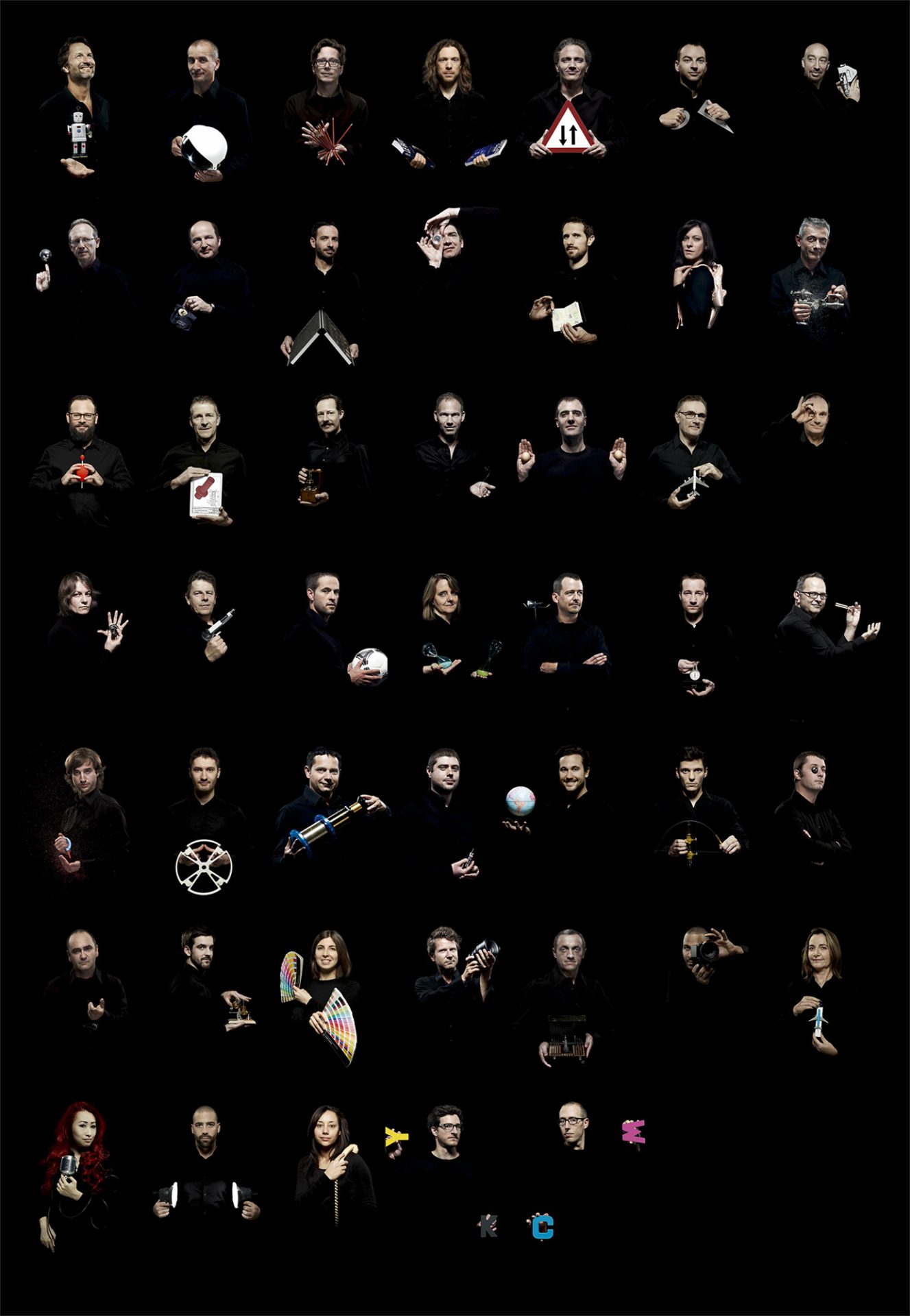
LEGACY MACHINE 101
Concept: Maximilian Büsser / MB&F
Product design: Eric Giroud / Through the Looking Glass
Technical and production management: Serge Kriknoff / MB&F
Movement design and finish specifications: Kari Voutilainen
R&D: Robin Anne, Thomas Lorenzato, Joey Miserez and Julien Peter / MB&F
Wheels and profile-turning: Jean-François Mojon / Chronode, Paul André Tendon / Bandi, Alain Pellet / Elefil Swiss, Patrice Parietti / MPS Micro Precision System, Daniel Gumy / Decobar and Le temps retrouvé
Double hairspring: Andreas Kurt / Precision Engineering
Stud and balance wheel bridge: Marc Bolis / 2B8 and Benjamin Signoud / AMECAP
Barrel: Stefan Schwab / Schwab-Feller
Plates and bridges: Alain Lemarchand, Jean-Baptiste Pretot and Romain Camplo / MB&F, Rodrigue Baume / HorloFab
Hand-finishing of movement components: Jacques-Adrien Rochat and Denis Garcia / C-L Rochat
Movement assemblage: Didier Dumas, Georges Veisy, Anne Guiter, Henri Porteboeuf and Emmanuel Maitre / MB&F
After-sales service: Thomas Imberti / MB&F
Quality Control: Cyril Fallet / MB&F
Case : Alain Lemarchand, Jean-Baptiste Pretot and Romain Camplo / MB&F
Case decoration: Sandra Lambert / Bripoli
Buckle: G&F Châtelain
Crown and corrector: Cheval Frères
Hands: Waeber HMS
Glass: Stettler
Strap: Multicuirs
Presentation box: Olivier Berthon / Soixanteetonze
Production logistics: David Lamy, Isabel Ortega and Ashley Moussier / MB&F
Marketing & Communication: Charris Yadigaroglou, Virginie Toral, Arnaud Légeret and Camille Reix / MB&F
M.A.D.Gallery: Hervé Estienne / MB&F
Sales: Thibault Verdonckt, Virginie Marchon, Cédric Roussel and Jean-Marc Bories / MB&F Graphic design: Sidonie Bays / MB&F, Adrien Schulz and Gilles Bondallaz / Z+Z
Product photography: Laurent-Xavier Moulin and Alex Teuscher
Portrait photography: Régis Golay / Federal
Website: Stéphane Balet / Idéative
Film: Marc-André Deschoux / MAD LUX
Texts: Suzanne Wong / Worldtempus
MB&F – GENESIS OF A CONCEPT LABORATORY
Founded in 2005, MB&F is the world’s first-ever horological concept laboratory. With almost 20 remarkable calibres forming the base of the critically acclaimed Horological and Legacy Machines, MB&F is continuing to follow Founder and Creative Director Maximilian Büsser’s vision of creating 3-D kinetic art by deconstructing traditional watchmaking.
After 15 years managing prestigious watch brands, Maximilian Büsser resigned from his Managing Director position at Harry Winston in 2005 to create MB&F – Maximilian Büsser & Friends. MB&F is an artistic and micro-engineering laboratory dedicated to designing and crafting small series of radical concept watches by bringing together talented horological professionals that Büsser both respects and enjoys working with.
In 2007, MB&F unveiled its first Horological Machine, HM1. HM1’s sculptured, three-dimensional case and beautifully finished engine (movement) set the standard for the idiosyncratic Horological Machines that have followed – all Machines that tell the time, rather than Machines to tell the time. The Horological Machines have explored space (HM2, HM3, HM6), the sky (HM4, HM9), the road (HM5, HMX, HM8) and the animal kingdom (HM7, HM10).
In 2011, MB&F launched its round-cased Legacy Machine collection. These more classical pieces – classical for MB&F, that is – pay tribute to nineteenth-century watchmaking excellence by reinterpreting complications from the great horological innovators of yesteryear to create contemporary objets d’art. LM1 and LM2 were followed by LM101, the first MB&F Machine to feature a movement developed entirely in-house. LM Perpetual, LM Split Escapement and LM Thunderdome broadened the collection further. 2019 marked a turning point with the creation of the first MB&F Machine dedicated to women: LM FlyingT; and MB&F celebrated 10 years of Legacy Machines in 2021 with the LMX. MB&F generally alternates between launching contemporary, resolutely unconventional Horological Machines and historically inspired Legacy Machines.
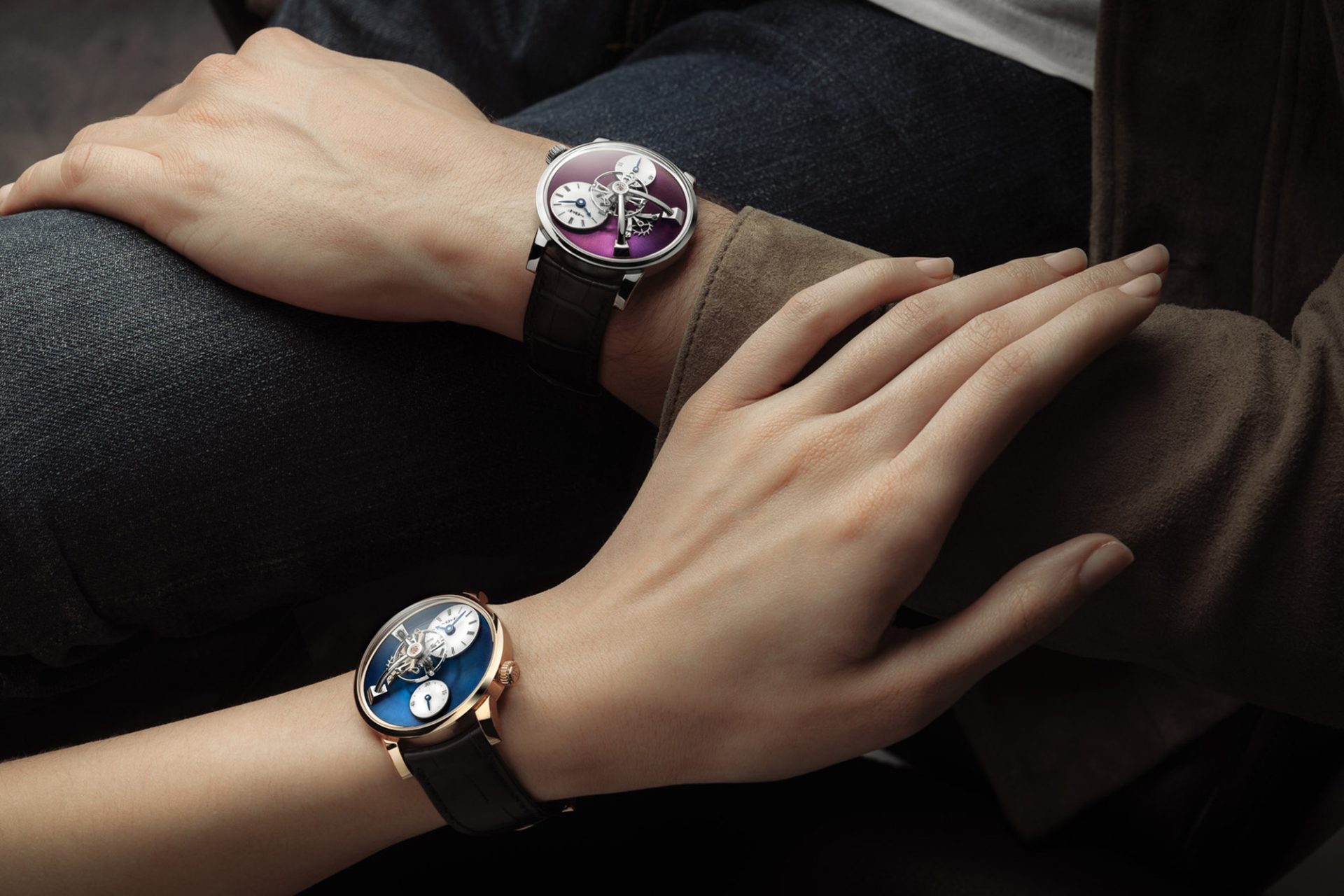
As the F stands for Friends, it was only natural for MB&F to develop collaborations with artists, watchmakers, designers and manufacturers they admire.
This brought about two new categories: Performance Art and Co-creations. While Performance Art pieces are MB&F machines revisited by external creative talent, Co-creations are not wristwatches but other types of machines, engineered and crafted by unique Swiss Manufactures from MB&F ideas and designs. Many of these Co-creations, such as the clocks created with L’Epée 1839, tell the time while collaborations with Reuge and Caran d’Ache generated other forms of mechanical art.
To give all these machines an appropriate platform, Büsser had the idea of placing them in an art gallery alongside various forms of mechanical art created by other artists, rather than in a traditional storefront. This brought about the creation of the first MB&F M.A.D.Gallery (M.A.D. stands for Mechanical Art Devices) in Geneva, which would later be followed by M.A.D.Galleries in Taipei, Dubai and Hong Kong.
There have been distinguished accolades reminding us of the innovative nature of MB&F’s journey so far. To name a few, there have been no less than 5 awards from the famous Grand Prix d’Horlogerie de Genève: in 2019, the prize for Best Ladies Complication went to the LM FlyingT, in 2016, LM Perpetual won the Best Calendar Watch award; in 2012, Legacy Machine No.1 was awarded both the Public Prize (voted for by horology fans) and the Best Men’s Watch Prize (voted for by the professional jury). In 2010, MB&F won Best Concept and Design Watch for the HM4 Thunderbolt. In 2015 MB&F received a Red Dot: Best of the Best award – the top prize at the international Red Dot Awards – for the HM6 Space Pirate.

